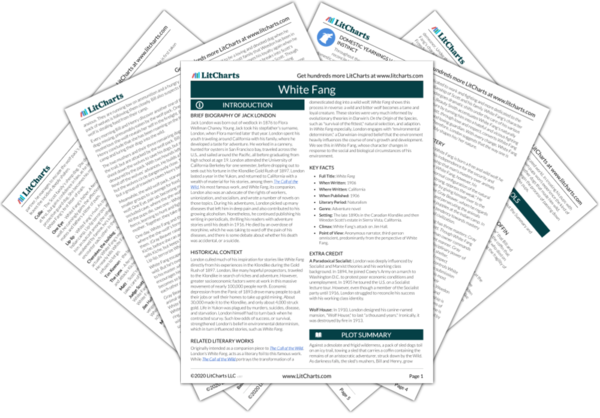From bitter and hateful beast to man's best friend, White Fang undergoes a process of domestication. He is born a wild wolf, becomes a morose and aloof pariah in the Indian camp, is trained as a vicious fighting dog under Beauty Smith, and finally transforms into a loving and loyal companion dog to Weedon Scott. Yet, White Fang becomes domesticated because he's trained, rather than tamed. Gray Beaver and Beauty tame White Fang to obey them with their clubs, but he still maintains his naturally fierce demeanor. Under the "tutelage" of Scott, however, White Fang's character actually changes and adapts to society's ways. From Scott's stern warnings with his voice and the cuff of his hand, White Fang learns not to attack other humans, and to never hunt farm animals. At the same time, Scott's patience and confidence in White Fang also teaches him to be a dutiful canine that embraces his owner's laughter and barks at the sign of trouble.
Above all, White Fang's unswerving devotion to his master marks him as a domesticated creature. That White Fang nearly sacrifices his life to defend Judge Scott against the maniacal Jim Hall demonstrates this transition. In this instance, White Fang exercises his natural instincts not to hunt or fend for himself, but in order to defend and service his human owners. Because White Fang selflessly fights for his human family, he shows himself to be a loyal and devoted canine. Fathering a litter of pups with Collie, a domesticated animal, also confirms his place in the domestic sphere. Although Scott trains White Fang well, his natural instincts are still present. London gives White Fang various names, a "tame wolf," a "Blessed wolf," and "the sleeping wolf," all of which suggest that White Fang's inner beast, though trained, lies dormant. In this way, London reminds us that within every domesticated dog there lies a trace of the wild.
Domestication ThemeTracker

Domestication Quotes in White Fang
Part 3, Chapter 2 Quotes
He [White Fang] belonged to [men]. His actions were theirs to command. His body was theirs to maul, to stamp upon, to tolerate. Such was the lesson that was quickly borne in upon him. It came hard – counter to much that was strong and dominant in his own nature; and while he disliked it – unknown to himself he was learning to like it. It was a placing of his destiny in another's hands, a shifting of the responsibilities of existence. This in itself was a compensation, for it is always easier to lean upon another than to stand alone.
Part 3, Chapter 3 Quotes
There was a difference between White Fang and them. Perhaps they sensed his wild-wood breed, and instinctively felt for him the enmity that the domestic dog feels for the wolf.
Part 4, Chapter 6 Quotes
[Scott's] voice was soft and soothing. In spite of the menacing hand, the voice inspired confidence. And in spite of the assuring voice, the hand inspired distrust. White Fang was torn by conflicting feelings, impulses. It seemed he would fly to pieces, so terrible was the control he was exerting, holding together by an unwonted indecision the counter-forces that struggled within him for mastery.
It was the beginning of the end for White Fang—the ending of the old life and the reign of hate. A new and incomprehensibly fairer life was dawning. It required much thinking and endless patience on the part of Weedon Scott to accomplish this. And on the part of White Fang it required nothing less than a revolution. He had to ignore the urges and promptings of instinct and reason, defy experience, give the lie to life itself.
Part 5, Chapter 3 Quotes
[White Fang] obeyed his natural impulses until they ran counter to some law... But most potent in his education were the cuff of his master's hand, the censure of the master's voice. It was the compass by which he steered and learned to chart the manners of a new land and life.











